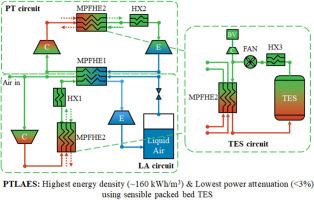Dynamic characteristics of pumped thermal-liquid air energy storage system: Modeling, analysis, and optimization
IF 9
1区 工程技术
Q1 ENERGY & FUELS
引用次数: 0
Abstract
Pumped thermal-liquid air energy storage (PTLAES) is a novel energy storage technology that combines pumped thermal- and liquid air energy storage and eliminates the need for cold storage. However, existing studies on this system are all based on steady-state assumption, lacking dynamic analysis and optimization to better understand the system's performance under cyclic operation. To fill this gap, the mainbody-linearized cyclic dynamic model of the PTLAES system with packed bed thermal energy storage (TES) was first developed. Then, the dynamic characteristics of the baseline system were investigated. Sensitivity analyses were carried out on TES parameters. Minimal values of levelized cost of storage (LCOS) were observed for all parameters in the range of interest. Subsequently, the TES circuit was optimized, and a triple improvement of efficiency and energy density enhancement, discharge stabilization, and cost reduction was achieved. The optimized system's round-trip efficiency and energy density increased from 61.7 % to 63.1 % and from 141.9 kWh/m³ to 159.2 kWh/m³, and the LCOS decreased from 163.2 $/MWh to 159.4 $/MWh. A power offset ratio lower than 3 % was reached, which is the lowest value ever reported in the literature. This study provides reference for future design and operation of the PTLAES system.

抽水蓄热-液态空气储能系统的动态特性:建模、分析和优化
抽水蓄热-液态空气储能(PTLAES)是一种新型储能技术,它将抽水蓄热和液态空气储能结合在一起,无需冷库。然而,现有关于该系统的研究都是基于稳态假设,缺乏动态分析和优化,无法更好地了解系统在循环运行下的性能。为了填补这一空白,我们首先开发了带填料床热能储存(TES)的 PTLAES 系统的主体线性化循环动态模型。然后,研究了基线系统的动态特性。对 TES 参数进行了敏感性分析。观察到所有参数在相关范围内的平准化储能成本(LCOS)均为最小值。随后,对 TES 电路进行了优化,实现了提高效率和能量密度、稳定放电和降低成本的三重改进。优化系统的往返效率和能量密度分别从 61.7% 和 141.9 kWh/m³ 提高到 63.1% 和 159.2 kWh/m³,LCOS 从 163.2 美元/MWh 降至 159.4 美元/MWh。功率偏移比低于 3%,是文献报道的最低值。这项研究为 PTLAES 系统今后的设计和运行提供了参考。
本文章由计算机程序翻译,如有差异,请以英文原文为准。
求助全文
约1分钟内获得全文
求助全文
来源期刊

Energy
工程技术-能源与燃料
CiteScore
15.30
自引率
14.40%
发文量
0
审稿时长
14.2 weeks
期刊介绍:
Energy is a multidisciplinary, international journal that publishes research and analysis in the field of energy engineering. Our aim is to become a leading peer-reviewed platform and a trusted source of information for energy-related topics.
The journal covers a range of areas including mechanical engineering, thermal sciences, and energy analysis. We are particularly interested in research on energy modelling, prediction, integrated energy systems, planning, and management.
Additionally, we welcome papers on energy conservation, efficiency, biomass and bioenergy, renewable energy, electricity supply and demand, energy storage, buildings, and economic and policy issues. These topics should align with our broader multidisciplinary focus.
 求助内容:
求助内容: 应助结果提醒方式:
应助结果提醒方式:


